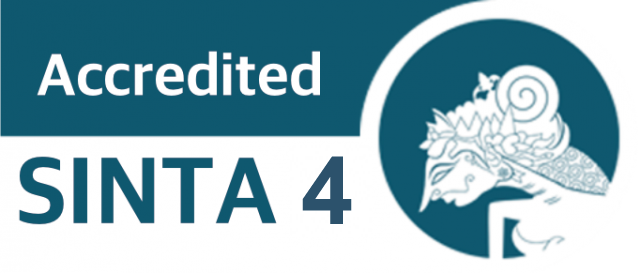Rancangan Pengembangan Instrumen Keterampilan Proses Sains Berbasis Pilihan Ganda pada Materi Momentum dan Impuls
Abstract
Full Text:
PDFReferences
Aminudin, A. H., Adimayuda, R., Kaniawati, I., Suhendi, E., Samsudin, A., & Coştu, B. (2019). Rasch analysis of Multitier Open-ended Light-Wave Instrumen (MOLWI): Developing and assessing second-years sundanese-scholars alternative conceptions. Journal for the Education of Gifted Young Scientists, 7(3), 557–579. https://doi.org/10.17478/jegys.574524
Chan, S. W., Ismail, Z., & Sumintono, B. (2014). A Rasch Model Analysis on Secondary Students’ Statistical Reasoning Ability in Descriptive Statistics. Procedia - Social and Behavioral Sciences, 129, 133–139. https://doi.org/10.1016/j.sbspro.2014.03.658
Jalil, S., Herman, Sidin Ali, M., & Haris, A. (2018). Development and validation of science process skills instrumen in physics. Journal of Physics: Conference Series, 1028(1). https://doi.org/10.1088/1742-6596/1028/1/012203
Kurniawati, A. (2021). Science Process Skills and Its Implementation in the Process of Science Learning Evaluation in Schools. Journal of Science Education Research, 5(2), 16–20. https://doi.org/10.21831/jser.v5i2.44269
Madsen, L. M., & Rump, C. (2012). Considerations of how to study learning processes when students use GIS as an instrumen for developing spatial thinking skills. Journal of Geography in Higher Education, 36(1), 97–116. https://doi.org/10.1080/03098265.2011.576336
Mahmudah, I. R., Makiyah, Y. S., & Sulistyaningsih, D. (2019). Profil Keterampilan Proses Sains (KPS) Siswa SMA di Kota Bandung. Jurnal Diffraction, 1(1), 39–43.
Mahmudah, I. R., Maulidah, R., & Sulistyaningsih, D. (2022). Profil Keterampilan Proses Sains Mahasiswa Calon Guru Fisika: Analisis Projek Pengamatan Sunspot dalam Pembelajaran IPBA. Diffraction, 3(2), 49–55. https://doi.org/10.37058/diffraction.v3i2.4476
Osman, K., Tuan Soh, T. M., & Arsad, N. M. (2010). Development and validation of the Malaysian 21st century skills instrumen (M-21CSI) for science students. Procedia - Social and Behavioral Sciences, 9, 599–603. https://doi.org/10.1016/j.sbspro.2010.12.204
Özgelen, S. (2012). Students’ science process skills within a cognitive domain framework. Eurasia Journal of Mathematics, Science and Technology Education, 8(4), 283–292. https://doi.org/10.12973/eurasia.2012.846a
Ramadani, M., Supahar, S., & Rosana, D. (2017). Validity of evaluation instrumen on the implementation of performance assessment to measure science process skills. Jurnal Inovasi Pendidikan IPA, 3(2), 180. https://doi.org/10.21831/jipi.v3i2.15534
Rizal, R. (2019). Implementasi Discovery Learning Untuk Meningkatkan Keterampilan Dasar Proses Sains Siswa Sma. Journal of Teaching and Learning Physics, 4(1), 1–10. https://doi.org/10.15575/jotalp.v4i1.3618
Rustaman, N. (2007). Asesmen Pendidikan IPA. Diklat NTT04, 1–7.
Samsudin, A., Fratiwi, N. J., Ramalis, T. R., Aminudin, A. H., Costu, B., & Nurtanto, M. (2020). Using Rasch analysis to develop multi-representation of tier instrumen on newton’s law (motion). International Journal of Psychosocial Rehabilitation, May. https://doi.org/10.37200/IJPR/V24I6/PR260865
Sumintono, B. (2018). Rasch Model Measurements as Tools in Assesment for Learning. 173(Icei 2017), 38–42. https://doi.org/10.2991/icei-17.2018.11
Suryana, T. G. S., Setyadin, A. H., Samsudin, A., & Kaniawati, I. (2020). Assessing Multidimensional Energy Literacy of High School Students: An Analysis of Rasch Model. Journal of Physics: Conference Series, 1467(1), 0–10. https://doi.org/10.1088/1742-6596/1467/1/012034
Turiman, P., Omar, J., Daud, A. M., & Osman, K. (2012). Fostering the 21st Century Skills through Scientific Literacy and Science Process Skills. Procedia - Social and Behavioral Sciences, 59, 110–116. https://doi.org/10.1016/j.sbspro.2012.09.253
Wibowo, F. C., Suhandi, A., Rusdiana, D., Ruhiat, Y., Darman, D. R., & Samsudin, A. (2017). Effectiveness of microscopic virtual simulation (MVS) for conceptualizing students’ conceptions on phase transitions. Advanced Science Letters, 23(2), 839–843. https://doi.org/10.1166/asl.2017.7542
Yamtinah, S., Masykuri, M., Ashadi, M., & Shidiq, A. (2017). An Analysis of Students’ Science Process Skills in Hydrolysis Subject Matter Using Testlet Instrumen. 158(Ictte), 101–110. https://doi.org/10.2991/ictte-17.2017.36
Yunita, Y., Nana, N., & Susanti, E. (2022). Profile of Science Process Skills of Taraju 1 Public High School Students through Two Stay-Two Stray ( Ts-Ts ) Learning by Making Mind Mapping on Newton ’ s Law Material. International Journal of Advanced Physics Education, 3(2), 1–5. https://amcs-press.com/index.php/ijape/article/view/858
DOI: https://doi.org/10.37058/diffraction.v5i2.8767
Refbacks
- There are currently no refbacks.
Copyright (c) 2024 Siska Dewi Aryani, Achmad Samsudin, Hera Novia

This work is licensed under a Creative Commons Attribution-ShareAlike 4.0 International License.
Jurnal ini terindeks oleh:
Pendidikan Fisika FKIP Univesitas Siliwangi
Gedung FKIP lantai 1, Jl. Siliwangi No. 24, Kota Tasikmalaya - 46115
email: diffraction.fisika@unsil.ac.id
DIFFRACTION: Journal for Physics Education and Applied Physics
terlisensi creative commons attribution-share alike 4.0 international



